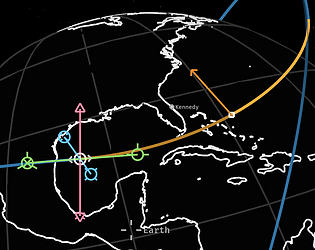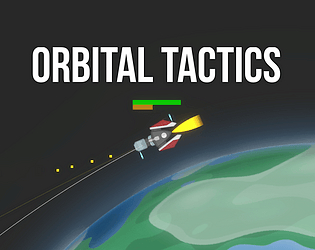Thanks for trying it out & thanks for the feedback! I’m going to keep working on this.
Lithobrake Labs
Creator of
Recent community posts
A few of my threads of thought go in the direction of that too! I've been trying out Children of a Dead Earth some more and keep thinking an open world gameplay (rather than mission-by-mission campaign) would be really cool, although then making the AI seems like it will be a lot of work. And indeed whether you play as a fighter / fleet commander / base commander also changes the whole thing.
Thanks - I find there is a lot that could be done in this space! An RTS with orbital physics would be really cool. One question I keep coming back to is scale. If we're thinking about making things realistic, space and especially time are on massively different scales from most other games, so handling pacing is a challenge. So from a game design point of view I'm also exploring a bit more in this direction.
I've ended up converging on this strategy too! Just brainstorming, I also think enemy progression would probably be the next thing this game could move towards (maybe going towards more structured arrivals / fewer smarter enemies?), as well as probably expanding the player's "mission" beyond just "protecting Earth".
These are all good ideas! I have been seriously considering multiplayer in various forms. It's very risky for me right now because as a game mechanic, it's harder to design and balance, and as a technical feature it is more challenging to make. So think of it as me starting small right now, and making bigger steps soon :)
This kind of detailed feedback is what keeps me going. I greatly appreciate it!
I agree landings now are too finicky to be interesting. I think it's a combination of a few things:
- The fatal speed is pretty low, & it's not clear what landing speed the ship is currently at; especially hard when zoomed out
- Damage relates to speed at point of contact; if you rotate towards the ground while landing, that increases contact speed
- When landed, moving the mouse still rotates the ship, which can be fatal on the Moon (the RCS overpower the weak gravity)
Fixing this is high prio right now. Once this is done I'd be curious if that encourages more landing & refueling.
More variety in ship to ship combat would be really cool (maybe with smarter AI), although this will be probably out of scope for the next update. I also have a new prototype in the works that I want to work on next (updates in the newsletter if you're not already on it :) )
What do you mean by docking by the way, I don't see any ship to dock to here so I'm probably misunderstanding?
That's great, thank you! :) I think the small scale of the world here plays into that a lot. In most of the Expanse, orbital velocities are much higher than muzzle velocities (planets are much more massive), and there's also a lot more space, so re-encountering a bullet is really unlikely. Running into your own bullets could also be a fun mechanic to keep around (maybe slightly toned down?).
It's pretty brute-force right now -- I predict trajectories for everything (planet, moon, ships) a few hundred frames ahead with a gravity-only simulation. I also predict a hypothetical bullet if it were just fired from the player's ship, and then check along its path to find the closest ship it ever approaches in the future. Only celestial bodies attract, so that cuts down on computation.
In general I think the predictor should mimic the physics engine as much as possible. For velocity & position, your Predict seems to be doing a variant of Størmer-Verlet, while (if you're on Unity) PhysX apparently does semi-implicit Euler, which my physics engine also uses, so that's what I use in my prediction code:
- forceAtPosition, acceleration as before
- currentVelocity += acceleration * deltaTime
- nextPosition = currentPosition + currentVelocity * deltaTime
- (assign nextPosition to positions[i], currentPosition)
Also make deltaTime the same as what PhysX uses. Oh and if your planets move, make sure to use their future (not current) position for the force (and if your planets also move under gravity... you need to predict everyone at the same time :) ).
Thanks so much! It uses a variant of the missile algorithm :) The game basically looks into the future by calculating where everything will be - both the enemy ships and where your bullet would go if you fired now - in a simplified gravity-only simulation. When it sees the paths cross, that's when your aiming line turns orange. (Sorry for the late reply, crunch time at work!)



